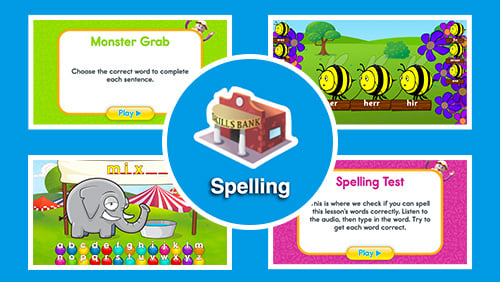
The average person can spell around 48,000 words. Roughly speaking, that’s one-tenth of the Merriam-Webster Dictionary, half the amount of total words in The Hobbit, and about as long as that email you shouldn’t have sent that one time.
Teaching students to memorise 48,000 words would mean they’d need to learn and retain 90 words per week for the entirety of their school life.
Assuming teachers haven’t had the time and superhuman wherewithal to guarantee the mastery of spelling 90 words a week, we’re left with two important questions:
- How does memorisation help students learn spelling?
- Where are we learning the spelling of these words?
Memorisation in the learning of spelling
Rote learning and visual memorisation have been the staple of spelling education for centuries, and it’s easy to see why:
- 84% of English words have predictable spelling;
- Memorisation helps with trickier words like ‘does’ and ‘were’;
- Memorisation of spelling can be taught without having to fully understand the complexities of the English language
However, memorisation has some weaknesses:
- Friday test, Monday miss – this phenomenon was named after it was found that students would often be able to master the spelling of words for their testing but failed to recall them when it came to other writing. Memorising words is a short-term solution and requires significant revision in order to move to long-term memory.
- Spelling must be used – rote learning spelling regularly follows a similar formula: students are given a weekly spelling list and test … but there’s no follow-up. Students need to use the words they are learning in genuine contexts in order to help make the connections needed for reliable recall.
- Rote learning generally teaches words in isolation – without context or connection. Just learning lists of related words does not ensure that students can actually make the necessary generalisations and connections to apply this knowledge to new and more difficult words. Spelling patterns, rules and connections need to be explicitly taught in order to allow students to spell similar but more complex words.
- Generalised visual memory doesn’t help us spell – it’s contribution to spelling ability is small, and where visual memory does have a more significant impact, it’s more related to the language functions of the brain.
This isn’t to say that rote learning is bad for spelling – on the contrary – memorising spelling is a necessary part of becoming a fluent writer and is an extremely useful way to help students learn more challenging, rule-breaking words.
But that leaves us with the question – if we didn’t memorise the spellings of those words as students, how did we learn enough words to be fluent spellers as adults?

Need a break from drilling word lists? Here are 6 spelling strategies to use in your next lesson
What it means to learn spelling
“Learning to spell is a complex, intricate cognitive and linguistic process rather than one of rote memorisation”
If we can switch gears for a moment, let’s think about how multiplication facts are taught. Many students are taught to memorise these facts through rote learning – singing, chanting, scribing, drilling and testing. But it’s almost impossible to quickly learn all 100 (or 144) facts … until we work out that there are patterns that can help us. We can skip count by 5s to learn the 5x facts. The tens facts all end in a zero. Finding 7 x 9 seems hard until we learn that it’s the same as 7 x 10 minus 7. And if we know 3 x 6 we also know 6 x 3.
We can look for the patterns and gradually memorise the facts – because having automatic recall is much more efficient!
Learning to spell is much the same. It is all about investigating, finding patterns and making generalisations. Spelling is a complex, intricate cognitive and linguistic process rather than one of rote memorisation.
We mentioned before that rote learning is beneficial to teachers because it doesn’t press them with the responsibility of mastering the English language – because it’s an endless (and endlessly fascinating) topic.
However, there are four main aspects of spelling that are instrumental in understanding it as a subject; phonology, orthography, morphology, and etymology.
Phonology
Phonology is the relationship between the sounds of letters and words. In spelling, phonological skills involve the ability to segment and blend words into their smallest units of sound (phonemes), break words into syllables, distinguish between vowels and consonants and make sound-to-letter correspondences.
Orthography
Orthography relates to the knowledge of alternative graphemes, sensitivity to letter patterns and knowledge of spelling rules and allowable letter groupings.
Morphology
Morphology is the study of the smallest meaningful units within words (morphemes) and how to manipulate them to build words from base words and roots. This includes the study of prefixes and suffixes.
Etymology
Etymology is the study of the history of words; their origins, evolutions, and changes to definitions over time. A rich understanding of etymology assists with both spelling and vocabulary development.
Helping students understand these concepts
Teaching these aspects of spelling can be challenging for teachers – for those who are fresh to these ideas, you’ll need support understanding the fundamentals, and for those who have a strong grasp, it can be difficult to find resources to support this approach to learning spelling.
Need help teaching spelling?
We’ve got you covered.

Reading Eggs is an award-winning literacy program with over 300 spelling lessons
Sources
Innovative linguistic inquiries in the primary classroom – Tessa Daffern, Practical Literacy
Using research to make informed decisions about the spelling curriculum – Texas Journal of Literacy Education – Volume 5, Issue 1
Linguistic skills involved in learning to spell: An Australian Study – Language and Education





